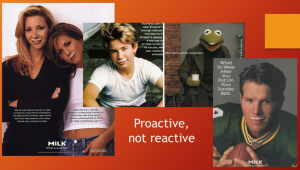“Oh, just what I need. A lecture from liberal Hollywood.”
This is a quote from a Family Guy episode where Sean Penn saves Stewie Griffin from falling to his death and proceeds to save the town with a delivery of vaccines.
Shows like Family Guy and South Park tend to deliver a hilariously good and edgy story with regards to the hot topics in science. From The Pandemic Special to anti-vaccine activism, it’s a way to poke fun of anti-science movements while showcasing the underlying need for modern medicine.
Case in point was this Family Guy episode called “Quahog Under Quarantine” in which Lois becomes an anti-vaccine activist and the entire town breaks out into a terrible case of the measles — some of the town’s residents even lose their lives. Brian is the voice of reason and tries to debunk her beliefs, yet ultimately Sean Penn saves the day, and Lois admits she was wrong and learns her lesson.
This ties in perfectly with what we are experiencing with COVID-19. Public health crises are no laughing matter, but sometimes it takes a funny, edgy, celebrity-style approach to get the point across. Anti-vaccine activists oftentimes go hand in hand with the anti-GMO crowd, vegan animal rights extremist ideologies, or other beliefs usually brought on by misinformation or bad science that is readily debunked.
We in agriculture experience it all the time. People can be so unbelievably far removed from how their food is produced that they sometimes latch on to the first belief they hear and don’t try hard enough to challenge their views or study the other side of the argument. Celebrities sell, fear sells, hyperbole sells, “secrets they don’t want you to know” sells, and these things create “cult like” groups of people who feel like they belong to a tribe or club.
Money sells ideologies as well. It’s no secret that animal rights extremist groups like PETA hire celebrities (Pamela Anderson famously comes to mind) to push their views and solicit donations for their groups, even if what they state about animals or livestock is not true.
Robert Saik, author of Food 5.0: How We Feed the Future, did this Facebook post that talks about how celebrities and Hollywood get things wrong so often.
While this somewhat viral post received a lot of attention, and some were confused with what this had to do with Hollywood, that’s really what it’s about. Look at celebs such as Joaquin Phoenix, Arnold Schwarzenegger, Ellen Degeneres, and Natalie Portman — the people who lobby their skewed beliefs on animal agriculture while promoting the vegan agenda across platforms like social media and the Oscars. These voices have major power, whether we like it or not.
The good news however is that the agriculture world can influence them and take back the narrative. Remember how cool “Got Milk?” and the milk mustaches were in the ’90s? We had every famous person under the sun to talk about how nutritious it was, and milk was so cool! I remember being a kid and thinking how much I wanted to drink milk to look like a pro athlete or supermodel, all because of this amazing campaign!

STEM overall needs to remember to include these powerful voices to convey the science behind vaccines, cosmetic, skincare safety, GMOs, livestock care, and so much more. These are important products that touch our lives every day, and it’s important we give science a bigger voice in a fun, unique, funny, or interesting way with powerful influential voices.
Science communicator and University of Florida professor Kevin Folta did this podcast recently to try to help people understand the science and safety behind the COVID vaccine. But if you listen, he talks about how he reached out to the companies who make vaccines and none of them were available for comment. This is a huge science communication fail. How can we be expected to feel comfortable with their product if their own scientists don’t speak publicly or aren’t allowed to?
Related: Using satire to improve science communication to the public
“The Eco Well” is another great podcast and social media platform. It’s run by Jen Novakovich, who talks about how cosmetic scientists are not allowed to talk about what they do to the general public because, oftentimes, it directly interferes with corporations and their marketing campaigns. For example, “Paraben Free” is one of the biggest trends of late in the cosmetic world, yet scientists like her know that parabens are one of the safest ingredients you can currently include in these skincare products. I was a guest on her podcast to talk about this and the crossover in both skincare and the food world. Marketing in our industries is not usually lined up with science, unfortunately.
Science has a PR problem and needs a bigger voice in a sexy, funny, unique, and mainstream way. Scientist need to speak out, and they need to be allowed to. Celebrities, social media influencers, commercials, and TV need to be honest in their messaging. Only when science is interesting and “cool” will we be fully able to move forward positively for the good of society.
Michelle Miller, the Farm Babe, is a farmer, public speaker and writer who has worked for years with row crops, beef cattle, and sheep. She believes education is key in bridging the gap between farmers and consumers.



